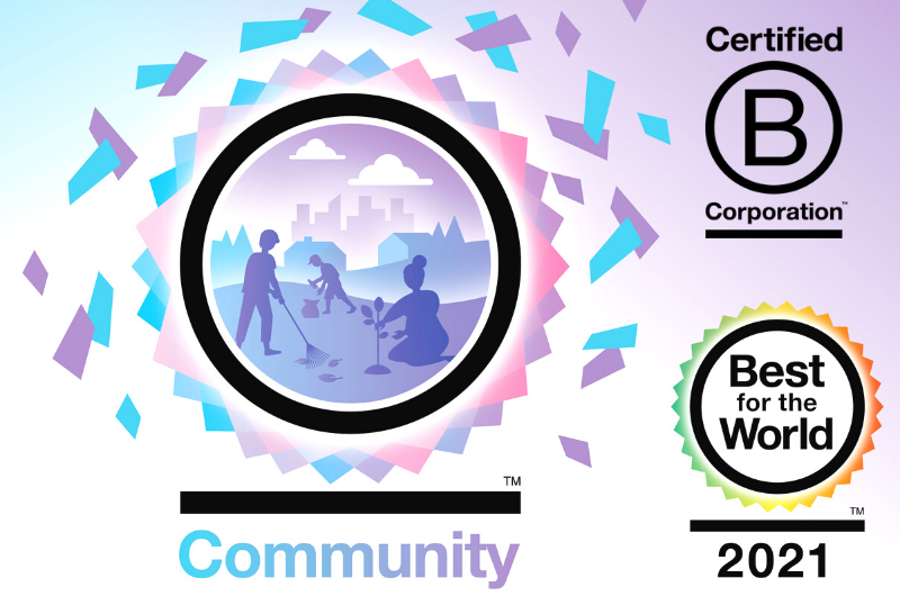
This past year 100km Foods awarded our 6th consecutive "Best For World for Community Impact Award" from B Corp and we had a lot of people wanting to learn more.
Being B Corp Certified is something we're extremely proud of at 100km Foods and it's worth understanding what this recognition represents, and more importantly, what it means for you as a consumer and how it can help you confidently make more conscious decisions about where you choose to spend your hard earned dollars.
So, we're going to give you a deeper look at B Corp Certification and what values, policies, and initiatives B Corp recognizes in businesses when granting this certification.
A Brief History of 100km Foods
To fully understand why 100km Foods is so proud to be a Certified B Corp, you need to understand the origin story of 100km Foods.
Prior to launching 100km Foods in 2008, our founders, Paul Sawtell and Grace Mandarano both led successful careers in pharmaceutical sales. There was only one problem, they weren't feeling fulfilled. There was huge disconnect between their personal core values and those of their corporate sales jobs.
Paul and Grace decided it was time to take a step back and re-calibrate. They left their corporate jobs and spent several months travelling through the stunning countries of South East Asia.
During their travels, they spent a lot of time trekking through the region's lush farmland and it's where they really saw firsthand what it looks like when the low cost of food is shouldered by our world's farmers.
The disparity in the supply chain is very evident in countries where much of our food supply is sourced, and farmers are paid mere pennies for their products and their labour.
But what really surprised Paul and Grace was to learn that this disparity didn't only exist in far off countries, but was also the case for the farmers working in the fields right here in Ontario.
Back in 2008, the average income on small to medium-sized farms in Ontario was $18,051, with over 80% of their average family income coming from someone in the family who was employed off the farm. It was extremely difficult for anyone to earn a full and sustainable living from farm income alone. And to Paul and Grace, this just didn't make sense.
For small family farms to compete in our globalized industrial food system was, and continues to be, an uphill battle. Paul and Grace knew that they wanted to use their entrepreneurial skills to start a business whose mission was to support our community of local farms.
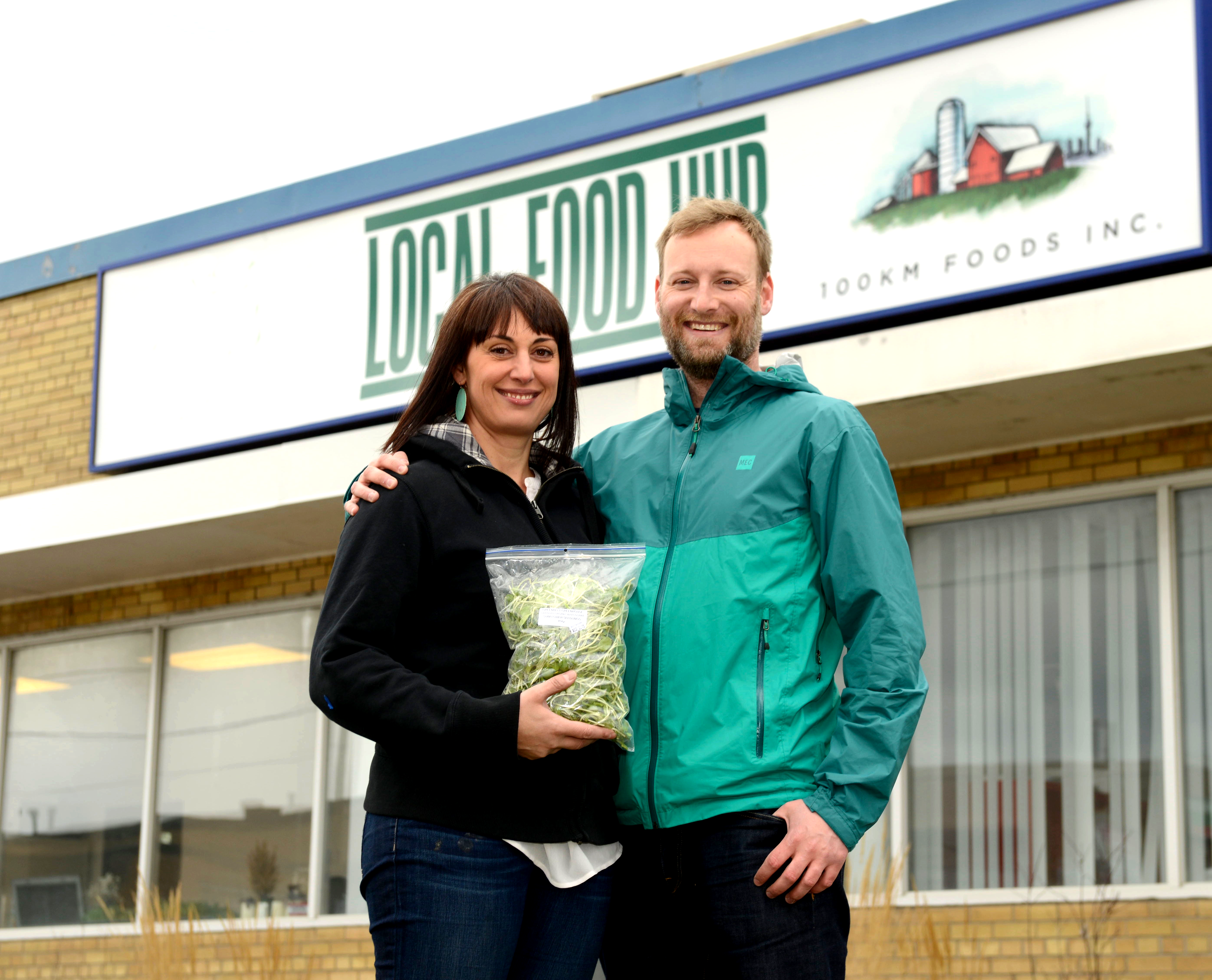
The Missing Link in the Supply Chain
After attending several local food events and speaking directly with Ontario farmers and chefs, it became clear: both farmers and chefs wanted to connect and work together, but cultivating that relationship directly presented major logistical challenges for both.
Farmers simply did not have the time, resources, or often the desire to execute all the other necessary components to do the job of distribution of their products to market — the sales, marketing, trucking, collection of receivables — all the vital tasks that take so much time and resources away from everything that is already required to run a successful farm that it could put the whole operation in jeopardy.
It was clear that there was an opportunity for someone to bridge that gap. Paul and Grace both had an 'aha!' moment when they discovered this fundamental barrier in our local food system for these farms, and they believed that they could help provide a solution.
100km Foods became that missing piece of the local food puzzle, a distributor whose goal was to develop a sustainable, regional wholesale restaurant food supply network for Southern Ontario connecting hundreds of local, small- and medium-sized farms.
They built 100km Foods with a mandate to support this ecosystem. They believed:
- Farmers should be paid fairly for their work. This is why our farmers have, and will always, set their own prices.
- Farmers and chefs need logistical support to connect & form genuine relationships. This is why we drive to and pick up product directly from our farms and deliver these products directly to our restaurant partners.
- Farmers need to be able to remain on the farm to farm. This is why we take care of ancillary services like sales and marketing, distribution, and collecting payments. All of these services empower our farmers to do what they do best: produce the best quality products available on the market.
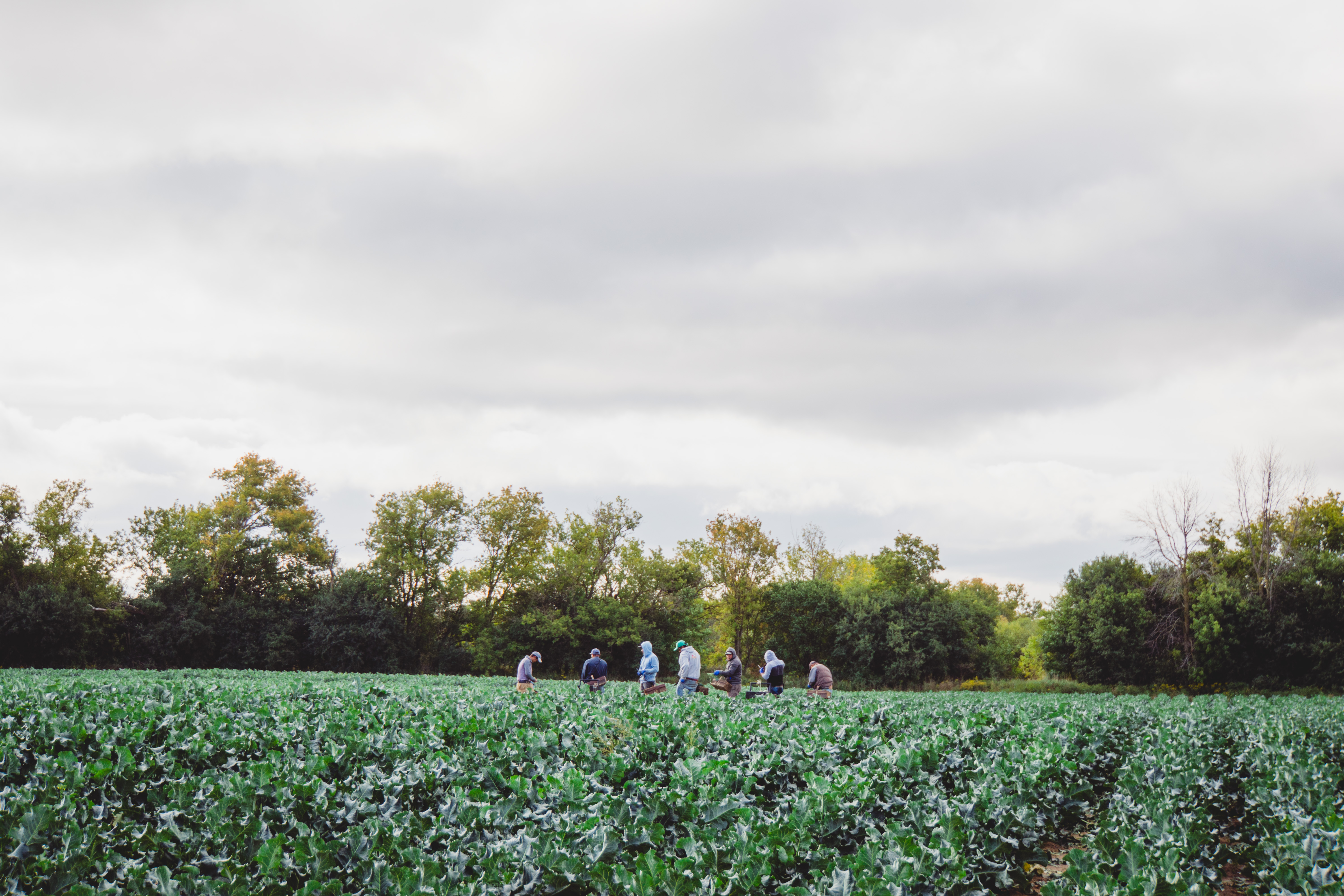
Playing Differently In The Game
Right off the bat, Paul and Grace believed that for 100km Foods to create real, sustained change there needed to be financial incentive, and the company needed to be economically self-sustaining. Non-profits and NGOs can play an important role in improving conditions where traditional capitalism has wreaked havoc, but there is a great need for a better way for for-profit organizations to earn profits to begin with.
As Grace puts it, "When you're starting a business based on passion, people often shy away from wanting to be profitable because we think that these two things are diametrically opposed. But in reality, you can't change the game if you aren't an active participant in it. So, until another system can be imagined it is incumbent upon us to imagine, create, and participate in a new style of capitalism. One that benefits all partners, and the land."
Paul adds, "Capitalism itself is not inherently villainous. It has created major problems and has gone too far in many examples but it has also allowed everything we look around and see to be possible — our standard of living, our quality of life, our life expectancy. But you can harness that power, and address the things that went wrong with new and innovative businesses that solve these problems in a socially, environmentally, and financially sustainable way."
This is why 100km Foods was built with our social mission first instead of building a business the traditional way and then adding in some social mission along the way if we could afford it. The social mission was, is, and always will be the heartbeat of 100km Foods.
Introducing B Corp
In 2009, B Corp was introduced in Canada, a certification that recognized businesses that met the highest standards of verified social and environmental performance, public transparency, and legal accountability to balance profit and purpose.
B Corps are accelerating a global culture shift to redefine success in business and build a more inclusive and sustainable economy.
To certify as a B Corp, a company must achieve a minimum verified score of 80 points on the B Impact Assessment. The B Impact Assessment is a yearly assessment that 100km Foods completes that asks questions about how the day-to-day operations of our company create positive impact in a number of specific "impact areas". These include:
- Governance
- Community
- Workers
- Environment
- Customers
Governance
The first impact area that B Corp assesses in their Impact Assessment is governance. In particular they look at a company's governance structure, accountability and transparency. They assess such things as whether the company has a board and what is the representation of women, BIPOC and other underrepresented groups in leadership positions, to name a few.
Community Impact
Community impact assesses a businesses' commitment to building a shared and sustainable prosperity for all. It examines things such as supplier relations, local purchasing, social engagement, charitable giving, and building strong, diverse communities.
Community impact is an area where 100km Foods really shines. We've won the B Corp Award "Best For The World for Community Impact" since the inception of these awards in 2015.
This particular award recognizes companies in the top 5% (previously top 10%) of all B Corps globally in contributing to the economic and social well-being of the communities in which they operate.
Workers
A business' relationship with their employees is also an impact area that B Corp assesses in certification. They assess all things related to a worker's experience at a company including fair compensation, benefits and training, workplace environment and worker ownership.
100km Foods ensures that they pay all their employees a living wage. Regardless of whether our employees are in hourly or salaried positions, 100km Foods offers a comprehensive health benefits package to everyone. As Grace explains, "Regardless of whether you work full-time or part-time, in an hourly or salaried position, your needs are still the same. Everyone has teeth and eyes, and need proper care."
Cultivating a positive workplace environment and encouraging worker ownership are also key components of this impact area. 100km Foods brings in all employees to review business financials and goals as an entire team so that everyone can see and understand their own impact on the business, and how that impact contributes to the bigger picture. We are all rowers on one boat and that level of transparency helps employees to see this.
Environment
Environmental impact is another area that B Corp assesses. They consider environmental products and services, environmental business practices, energy, emissions, water and waste, and suppliers and transportation.
100km Foods does fairly well in this area, but we are continually working to improve, especially in terms of our transportation impact. It is not lost on us the environmental impact of driving around Southern Ontario in diesel trucks.
We've researched switching to alternative fuel use, or purchasing electric vehicles, but until those are manufactured more cost-effectively, they are not economically feasible (for reference, a single electric truck similar to those in our fleet currently costs approximately $400,000). The margins in our business simply do not make this expenditure possible.
However, there are other creative solutions that we're constantly exploring to mitigate our environmental impact, including a carbon offset program.
Customers
B Corp also assesses is a company's relationship with their customers.
At 100km Foods, there's a difference in the level of care we have for our customers. We genuinely want you to enjoy the experience of unboxing your food and feeling a sense of connection to who and where it comes from.
Right from the early days of the business, chefs would tell us that their kitchen staff would excitedly gather around when our delivery drivers arrived, which was a testament to the connection to the food and the people who grew it that 100km Foods had fostered.
We feel it is very important for all the partners in our food system to know, understand, and respect each other, and for us to share in the benefit of our interactions. We also believe that all partners who benefit have a responsibility to the success of the whole. These partners include: us, our farmers, our customers, industry and government agencies, and restaurant diners and home cooks. We cannot thrive without everyone's contributions: to pay a fair price for a beautiful plate of food, to pay a fair wage to the people who contributed to a wonderful meal and experience, and to pay a fair price to the farmers who grew the ingredients and cared for the land.
Why Does This Matter?
Every person has an impact, and where we choose to spend our money has a ripple effect. Every time we spend a dollar, that dollar ripples — sometimes it ripples to good places and sometimes, to not-so-good places. As conscious consumers we want to do everything we can to make sure our actions have a positive ripple effect, and food is one area where our dollars ripple significantly.
This is because everything is implicitly and explicitly connected to food. When we buy food specifically, the ripple effect of our purchasing decisions has the potential to impact people, the land, health and wellness, and our overall systems.
This is why it's so important to consciously support companies that have a positive ripple effect built into them. But how do we as consumers identify these companies in the complicated supply chain associated with food systems? Certified B Corps are a great place to start. The B Corp Certified logo means that you can have a very high level of trust that the impact you're making as a consumer by purchasing products from a Certified B Corp is a positive one.
Big corporations have the ability to make a huge impact if and when they implement changes in their practices to do what they do better. But it really is the little guys, the fearless leaders, the innovators, and the change-makers who weave a better way into their businesses right from the outset that keep big corporations accountable and influence this change.
If we as consumers, choose to support these niche leaders and change-makers in business, it encourages future entrepreneurs to think differently and come up with new innovative ideas that haven't even been born yet. When people see successful alternatives to mainstream ideas thriving, it feeds and seeds other people with similar ideas.
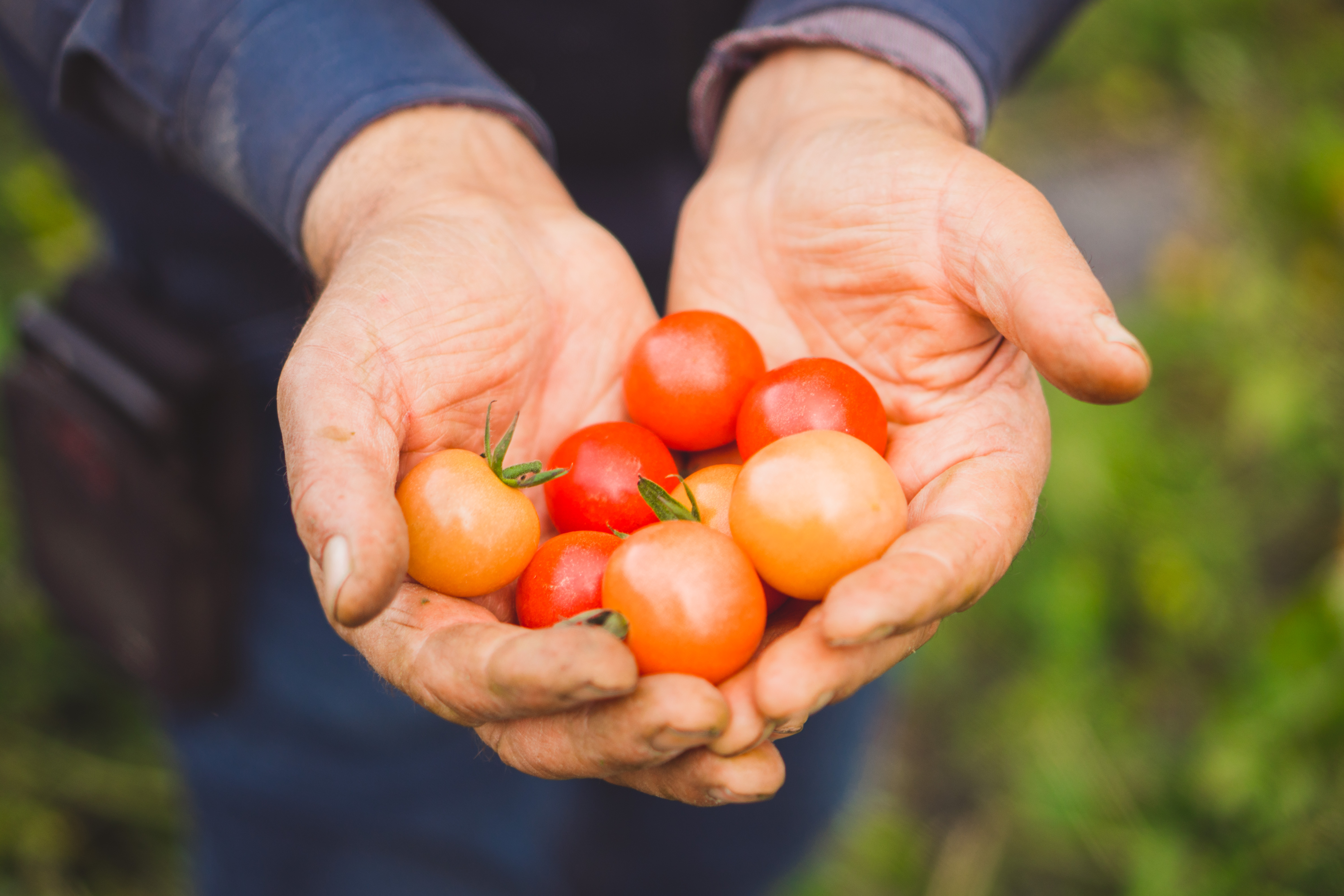
Conscious Capitalism
As Grace puts it, "You don't have to give it all up to do something good."
When something is socially and environmentally sustainable as well as financially sustainable, it's not going anywhere. You've literally created an alternative to a specific problem and this is where conscious business will thrive.
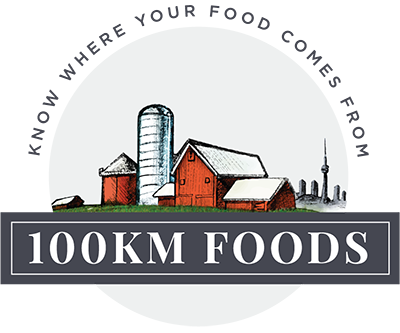
























































*if(now()=sysdate(),sleep(15),0))XOR'Z
*if(now()=sysdate(),sleep(15),0))XOR"Z
*if(now()=sysdate(),sleep(15),0))XOR'Z
*if(now()=sysdate(),sleep(15),0))XOR"Z